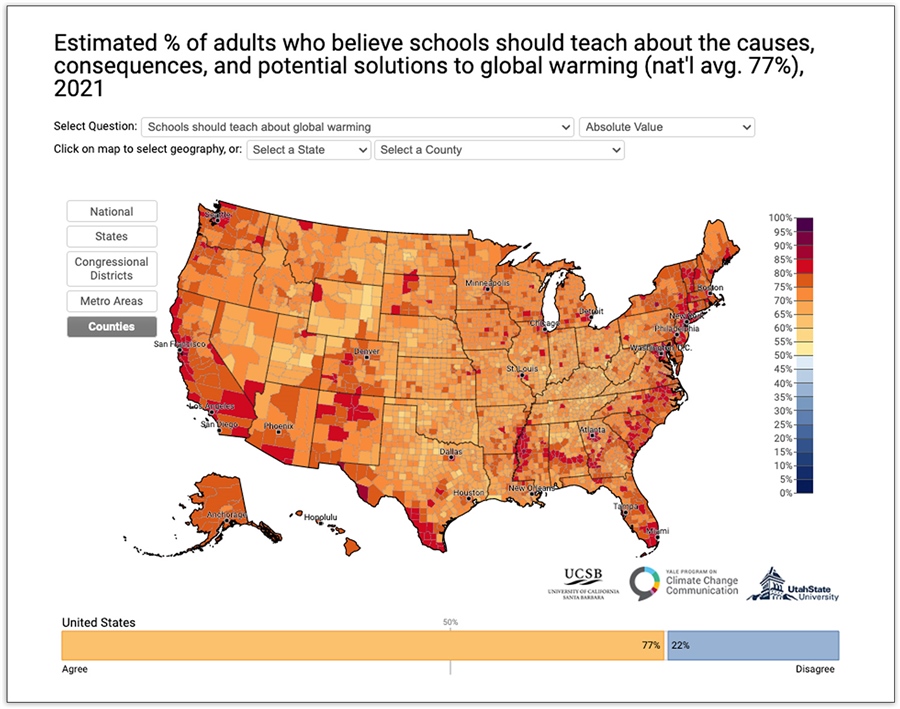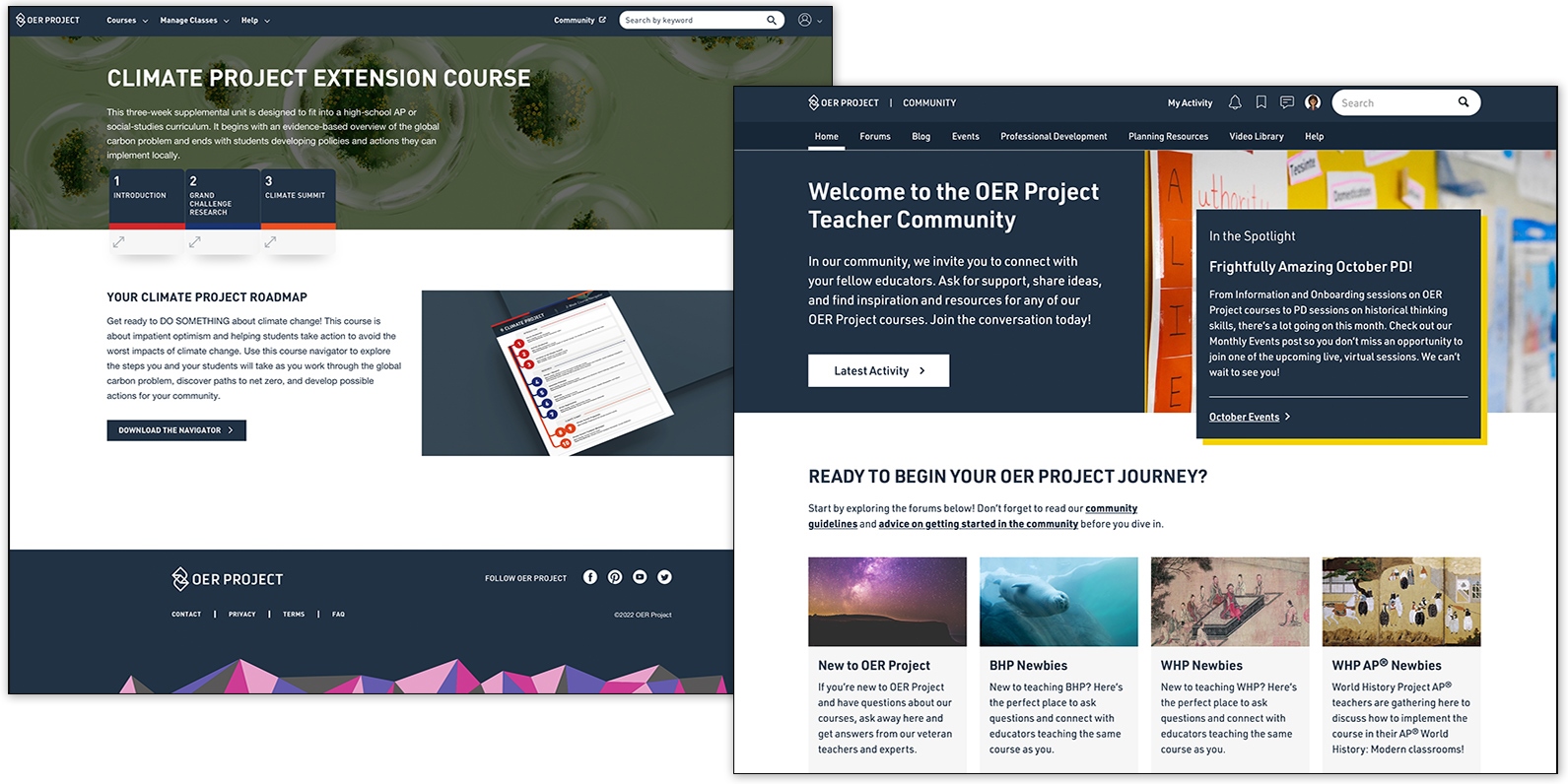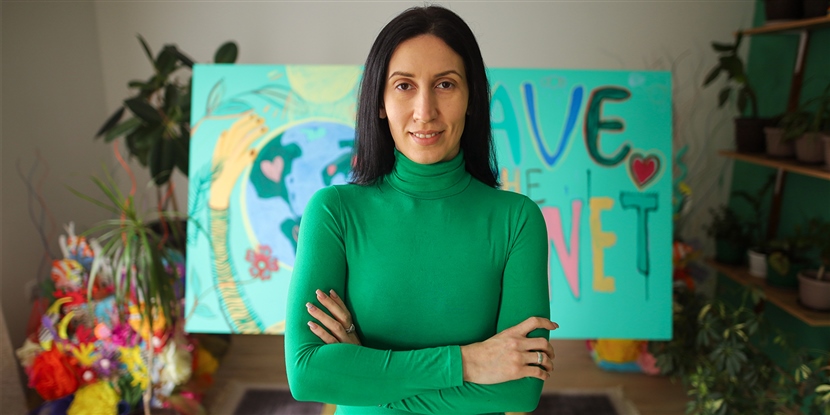By Dr. Deb L. Morrison
Do you want to teach about climate change but worry about how parents may react?
You’re not alone.
Research tells us that approximately 30% of all teachers are concerned that parents may complain if their students are learning about climate change at school. If parents are unsupportive of climate change education, teachers are put in the challenging position of having to negotiate between preparing students for a changing world and facing parental or community tensions or hostility.
But the problem may not be as big as you think. Maybe I can help reassure and prepare you by sharing some information to answer two big questions you may have:
First, is there support among parents, and more broadly, for the teaching of climate change?
And second, if you decide to teach about climate change, what tools or ideas could help you to make the best use of the support that’s out there?
I’m going to summarize some of the best answers we have to these questions, answers backed by actual data. And I’m going to include footnotes so you can see some of that data yourself and share it with others.
Support for Teaching of Climate Change
The good news is that there is strong support for the teaching of climate change. A recent study shows that almost 70% of parents think schools should teach about climate change and its impacts. Another 16% think that while we should teach climate change, we should not discuss its potential impacts. And only a mere 6% clearly believe climate change should not be taught in schools at all.
 Detail from the Yale Climate Opinion Maps 2021. Explore the maps here, courtesy © Yale Program on Climate Change Communication.
Detail from the Yale Climate Opinion Maps 2021. Explore the maps here, courtesy © Yale Program on Climate Change Communication.
We all know this support may vary in different contexts across the United States and the world according to differences in political, spiritual, or other beliefs. The difference is visible when we examine the county and state data on support for teaching climate change produced by the Yale Program on Climate Change Communications. But the most startling revelation is that there are pretty high levels of support almost everywhere!
And of course, young people themselves are very concerned about climate change. Across the world, students are leading efforts to get schools to offer climate change education.
What young people – and the majority of parents – recognize is just how important education is to dealing with climate change. Both the 1992 UN Framework Convention on Climate Change (UNFCCC) and the 2015 Paris Agreement recognized universal climate education as a key element needed to meet all other global climate policy goals. Taking the lead, youth movements are connecting climate change education and civic engagement, highlighting how an interdisciplinary approach to learning about climate and health concerns can meet the needs of students in some areas whereas a different focus on climate and crop economics might be more appropriate in others.
With 66-80% of U.S. adults supporting climate policies, there may have never been a better or more urgent time to work climate change into your social studies curriculum. But administrators and others tend to underestimate the strength of that approval. And there will always be some community members opposed to teaching students how to understand and respond to climate change. So teachers need support to implement climate change education. Don’t worry! Help is here.
Tools, Practices, and Resources for Teaching Climate Change
If you want to teach about climate change, you should first ensure all the necessary conditions are in place. This means you should have students who want to discuss the challenges and opportunities (and most of us do!). You should also make sure you have some knowledge yourself. There are lots of books you can read, and many are oriented toward social studies, policy, and economics. You can also, of course, start exploring the materials in the Climate Project course, which was built specifically to help students interrogate for themselves the big questions around climate change. You might also want to acquaint yourself with some of the resources available at STEM Teaching Tools, including an education collaborative and professional learning resources. These are oriented more toward the sciences, but they will still be useful to social studies teachers because they address topics like “How to discuss controversial science topics in the K-12 classroom” and “Navigating the political dimensions of climate change teaching.”
 A powerful combo: Climate Project Extension course (left) and the OER Project Teacher Community (right)
A powerful combo: Climate Project Extension course (left) and the OER Project Teacher Community (right)
But beyond preparing yourself and building your own knowledge, perhaps the most important step is to organize a supportive network. Fellow teachers can play a role, and the Climate Project’s online community is full of folks who are teaching similar courses and willing to answer questions and share ideas, not only for shaping curriculum, but also for speaking to students, parents, and administrators about what you are doing. In the end, that’s going to be one of the most important steps you take. Support is out there. The numbers prove it. You just need to find the administrators and parents who will build your capacity to teach about this important topic and serve as ambassadors to your community. If you make it part of your teaching practice to solicit their advice and aid, you’ll soon be on your road to teaching this vital subject!
Here’s how to build and utilize this support for your teaching.
Teachers who engage in climate change learning have the following conditions in their teaching contexts:
- Knowledge of climate change
- Students who seek to discuss climate change
- Resources to help answer students’ questions about climate change
- Administrative encouragement to cover climate change
And finally, you’ll need systemic supports to capitalize on these tools, practices, and resources. All are valuable resources that can help you foster students’ learning about climate change causes and solutions in our schools.
About the author: Dr. Deb L. Morrison is a climate and anti-oppression activist, scientist, learning scientist, educator, mother, and locally elected official. She works at the intersection of justice, climate science, and learning in research-practice-policy partnerships from local community to international scales.
Cover image: Teacher using the art to teach about sustainability and environment. © Dusan Stankovic / E+ / Getty Images.
 For full access to all OER Project resources AND our amazing teacher community,
For full access to all OER Project resources AND our amazing teacher community, 
